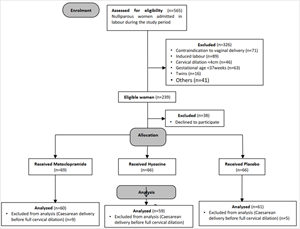Metoclopramide Versus Hyosine Butyl-Bromide in Shortening Duration of First Stage of Labour Among Nulliparous Women in Abakaliki, Ebonyi State
Main Article Content
Abstract
Background: Administering antispasmodics during labour could lead to faster and more effective dilatation of the cervix preventing prolonged labour. However, due to scarce information on it, with no generally agreed protocol for its use in labour. This study is aimed to see if we can have more positive findings to support the existing literature for probable consideration as a protocol in labour management. Methodology: This was equivalence, open label; placebo controlled randomized trial among nulliparous women over a six months period. Eligible participants were randomized to receive a slow intravenous medication of one of these three medications-Metoclopramide (10mg), Hyoscine Bromide (20mg) or placebo. They were managed according to the institutional intrapartum protocol. Primary outcome was the duration of first stage of labour. Secondary outcome includes the rate of cervical dilatation, total duration of labour, route of delivery and Apgar score at 5th minute. Data was analysed with SPSS, version 25.0 (2017, SPSS Inc., Chicago IL, USA) and by the concept of intention to treat protocol. P-value of less than 0.05 was taken as significant. Results: Sixty women were included in the metoclopramide group, 59 women in the hyoscine bromide group and 61 women in the placebo group. There was statistically significant difference in the mean reduction of the first stage of labour (263.84±139.44mins=Metoclopramide), (Hyoscine Bromide=241.33±121.56mins) and (placebo = 318.43±203.44mins). The total mean duration of labour was significantly significant different among the groups (P<0.05), (295.86±138.7 = Metoclopramide, (271.69±122.35 = hyoscine butyl bromide) and (350.24±201.48 = placebo). There are no statistically significant differences among other variables studied. Conclusion: Metoclopramide is as effective as hyoscine butyl bromide in shortening duration of first stage of labour in nulliparous women with no recorded adverse effect. I recommend that they should be introduced as part of the protocol in active management of labour. Clinical Trial.gov: NCT05222646
Article Details

This work is licensed under a Creative Commons Attribution 4.0 International License.
